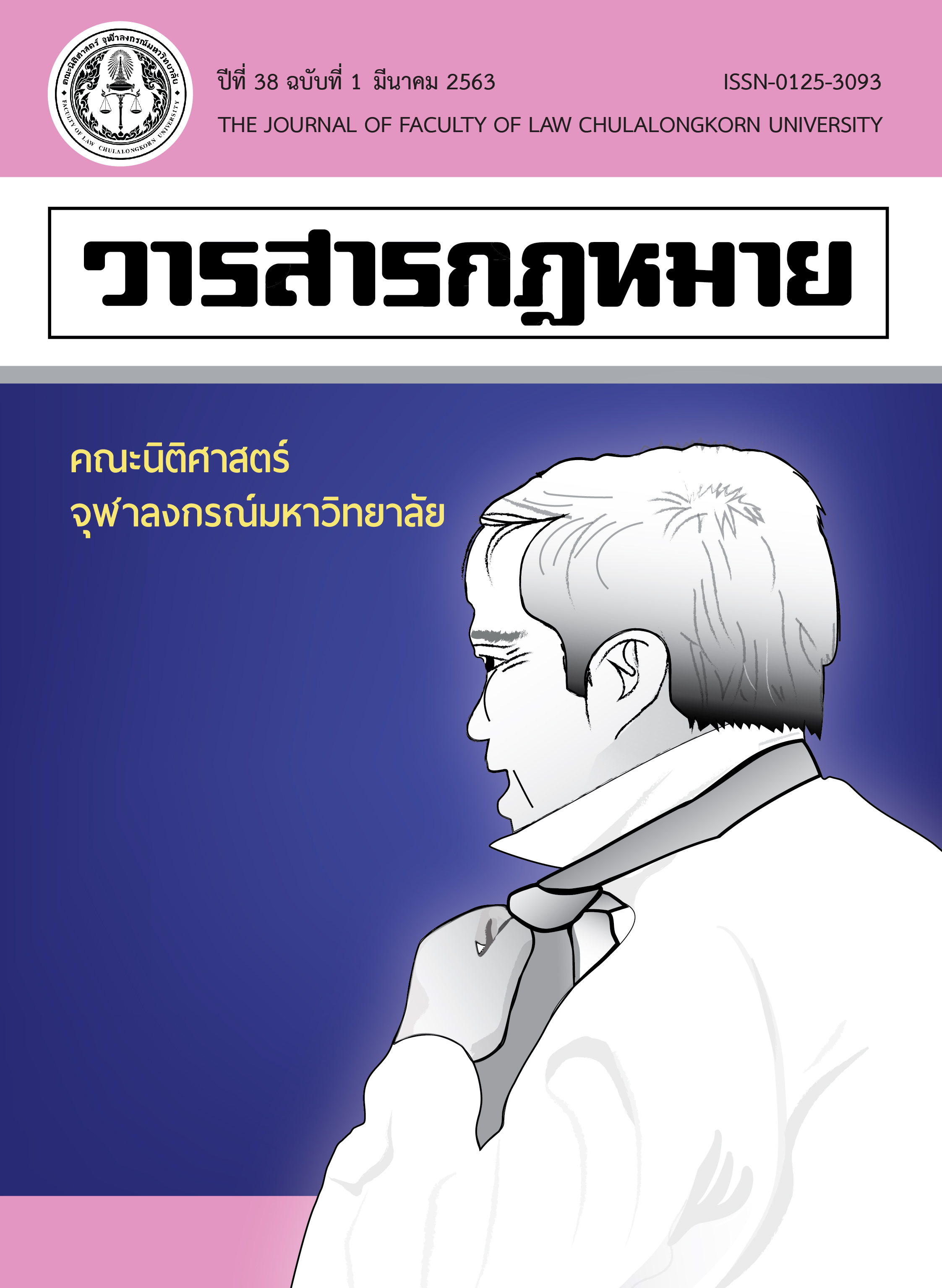การลดความรุนแรงในการบังคับคดียาเสพติด
Main Article Content
บทคัดย่อ
การกำหนดให้ความผิดเกี่ยวกับยาเสพติด โดยเฉพาะการผลิต การนำเข้า และการครอบครองเพื่อจำหน่ายยาเสพติด อันเป็นไปตามแนวทางของอาชญากรรมที่ต้องปราบปรามอย่างอดทนไม่ได้ (Zero Tolerant) ถือได้ว่าเป็นการบังคับคดีและบังคับโทษที่มีความรุนแรงและส่งเสริมให้มีการปฏิบัติที่ไม่มีมนุษยธรรมแก่ผู้ต้องขังคดียาเสพติด รวมทั้งมีการตีความการกระทำความผิดและอัตราส่วนโทษในลักษณะที่รวดเร็ว รวบรัด ปราศจากการแสวงหาความจริงแห่งคดี และส่งผลต่อการแสวงหาผลประโยชน์อันมิชอบของเจ้าหน้าที่ที่เกี่ยวข้องในการจับกุมผู้กระทำความผิด ทำให้เกิดปัญหาผู้ต้องขังคดียาเสพติดล้นเรือนจำ และการปฏิบัติที่ไม่เป็นไปตามมาตรฐานที่กำหนดไว้ในข้อกำหนดต่างๆของสหประชาชาติว่าด้วยการปฏิบัติเหมาะสมกับผู้ต้องขัง จึงควรนำนโยบายการลดความรุนแรงในการบังคับคดียาเสพติด (Harm Reduction) มาใช้ ซึ่งเกิดจากแนวคิดนโยบายทางอาญาสำคัญ 3 ประการ ได้แก่ การไม่กำหนดคดีอาญา (Decriminalization) ได้แก่ การแสวงหาเหตุผลในการไม่ดำเนินคดีอาญากับการกระทำความผิดเกี่ยวกับยาเสพติดระดับเล็กน้อย, การเปิดเสรียาเสพติด (Drug Liberalization) ได้แก่ แนวคิดในการให้ประชาชนสามารถใช้ยาเสพติดได้อย่างเสรีมากขึ้นโดยลดทอนความเป็นอาชญากรรมและมาตรการดำเนินคดี และการทำให้ยาเสพติดถูกต้องตามกฎหมาย (Drug Legalization) ซึ่งได้แก่ การบัญญัติกฎหมายภายในประเทศเพื่อรับรองการใช้ยาเสพติดประเภทนั้นๆว่าถูกต้องตามกฎหมาย
จากการศึกษาเชิงเอกสาร แนวทางในการลดความรุนแรงในการบังคับคดียาเสพติดของต่างประเทศ ได้แก่ สหพันธ์สาธารณรัฐเยอรมนี สาธารณรัฐฝรั่งเศส ประเทศเนเธอร์แลนด์ ประเทศสวิตเซอร์แลนด์ สหรัฐอเมริกา ประเทศนิวซีแลนด์ ประเทศโปรตุเกส ประเทศญี่ปุ่น ประเทศแคนาดา และประเทศเดนมาร์ก และประเทศไทย เพื่อประเมินประสิทธิภาพมาตรการทางกฎหมายของแต่ละประเทศเป็นไปตามมาตรฐานระหว่างประเทศ และบรรลุวัตถุประสงค์ว่าด้วยการลดความรุนแรงของการบังคับคดียาเสพติดหรือไม่ ผลการศึกษาคือ ประเทศที่ประสบความสำเร็จ ได้แก่ประเทศที่สามารถมีการกำหนดนโยบายและบทบัญญัติแห่งกฎหมายเพื่อกำหนดมาตรการลดความรุนแรงในคดียาเสพติด มีโครงการนำร่องต่างๆ เพื่อลดความรุนแรงในคดียาเสพติด รวมถึงการดำเนินการจำแนกผู้กระทำความผิดรุนแรงออกจากผู้กระทำความผิดเล็กน้อยหรือผู้ป่วย และปรากฏมาตรการรองรับการอบรม การบังคับบำบัดรักษา การนำสารเสพติดไปใช้ประโยชน์ทางการแพทย์ รวมถึงความร่วมมือระหว่างหน่วยงานของรัฐกับหน่วยงานภาคประชาชนอย่างมีบูรณาการ ประเทศในกลุ่มนี้ได้แก่ ประเทศโปรตุเกส ประเทศแคนาดา ประเทศเนเธอร์แลนด์ ประเทศเดนมาร์ก ประเทศสหพันธ์สาธารณรัฐเยอรมนี ประเทศสวิตเซอร์แลนด์ และประเทศนิวซีแลนด์ เป็นต้น ส่วนประเทศไทย ถือว่าเป็นการเริ่มต้นนำหลักการการลดความรุนแรงในคดียาเสพติดมาใช้ในลักษณะของการกำหนดนโยบายและหลักการ แต่ยังไม่ได้มีการบังคับใช้ในทางปฏิบัติ ที่ผ่านมารัฐบาลได้แก้ไขพระราชบัญญัติยาเสพติดให้โทษ จำแนกประเภทของผู้กระทำความผิดระหว่างผู้เสพ ผู้ป่วย กับผู้จำหน่ายอย่างจริงจัง ให้ความสำคัญมากขึ้นในกระบวนการบำบัดรักษา รวมทั้งการเปิดช่องทางให้สามารถทำการค้นคว้าวิจัยสารเสพติดที่อาจนำไปใช้เป็นประโยชน์ทางการแพทย์ได้
ข้อเสนอแนะสำหรับประเทศไทย ได้แก่ รัฐบาลต้องสนับสนุนให้มีการจัดตั้งกลไกประชาสังคมขึ้นมาเพื่อรองรับการทำงานด้านการป้องกันและแก้ไขปัญหายาเสพติดอย่างมีบูรณาการเพื่อนำไปสู่ความเป็นอิสระจากปัญหายาเสพติด (Drug Liberalization) ควรต้องมีการบัญญัติมาตรการทางกฎหมายที่ชัดเจน เพื่อจำแนกแยกแยะผู้ที่เกี่ยวข้องกับยาเสพติด ระหว่าง ผู้เสพ ผู้ติดยา ผู้ครอบครองเพื่อเสพ กลุ่มของผู้ที่ได้รับผลกระทบ ผู้รับจ้างขนยาเสพติด ผู้จำหน่ายรายย่อย ผู้จำหน่ายรายใหญ่ หรือองค์กรอาชญากรรม ออกจากกัน เพื่อการดำเนินคดีที่เป็นธรรมเหมาะสมกับระดับความผิดที่ผู้กระทำความผิดได้กระทำ ตามหลัก Individualization of Punishment ให้นำหลักหลักการไม่กำหนดความผิดอาญาและโทษทางอาญา (Decriminalization and Penalization) มาใช้โดยให้อำนาจศาลใช้ดุลพินิจในการพิจารณามาตรการที่เหมาะสมกับแต่ละราย โดยอาศัยข้อมูลจากการพิจารณาประวัติการกระทำความผิด พฤติการณ์แห่งการกระทำความผิด และความเห็นร่วมกันระหว่างตำรวจ พนักงานอัยการ และคณะกรรมาธิการคดียาเสพติด (Drug Committee) โดยคณะกรรมาธิการชุดนี้จะใช้หลักวิชาการแพทย์ในการวินิจฉัยเบื้องต้นว่าผู้กระทำความผิดนั้นเป็นผู้ป่วยที่ต้องแยกออกมาบำบัดจริงหรือไม่ เพื่อนำไปสู่การพิจารณาเลือกรูปแบบในการรักษาที่เหมาะสมต่อไป
Article Details
ลิขสิทธิ์และเนื้อหาในเว็บไซต์ของวารสารกฎหมาย (รวมถึง โดยไม่จำกัดเฉพาะ เนื้อหา รหัสคอมพิวเตอร์ งานศิลป์ ภาพถ่าย รูปภาพ ดนตรีกรรม โสตทัศนวัสดุ) เป็นกรรมสิทธิ์ของวารสารกฎหมาย และผู้ได้รับการโอนสิทธิทุกราย
1. วารสารกฎหมาย ให้อนุญาตให้คุณใช้สิทธิอันไม่เฉพาะเจาะจงที่สามารถถูกถอนเมื่อใดก็ได้ โดยไม่มีค่าใช้จ่าย ในการ
- เยี่ยมชมเว็บไซต์และเอกสารในเว็บไซต์นี้ จากคอมพิวเตอร์หรือเครื่องมือสื่อสารผ่านเว็บบราวเซอร์
- คัดลอกและจัดเก็บเว็บไซต์และเอกสารในเว็บไซต์นี้บนลงคอมพิวเตอร์ของคุณผ่านระบบความจำ cache
- สั่งพิมพ์เอกสารจากเว็บไซต์นี้สำหรับการใช้ส่วนตัวของคุณ
- ผลงานที่ได้รับการตีพิมพ์โดยวารสารกฎหมาย จุฬาลงกรณ์มหาวิทยาลัย ถูกคุ้มครองภายใต้ Creative Commons Attribution 4.0 International License ซึ่งอนุญาตให้ทุกคนสามารถคัดลอก แจกจ่าย ดัดแปลง ส่งต่อ ผลงานได้ ก็ต่อเมื่อผลงานและแหล่งข้อมูลได้รับการอ้างอิงอย่างเหมาะสม
2. วารสารกฎหมาย จุฬาลงกรณ์มหาวิทยาลัย สงวนสิทธิ์ไม่อนุญาตให้คุณใช้สิทธิอื่นใดที่เกี่ยวข้องกับเว็บไซต์และเอกสารบนเว็บไซต์นี้ เช่น การคัดลอก ดัดแปลง เปลี่ยนแปลง ส่งต่อ ตีพิมพ์ แจกจ่าย เผยแพร่ จัดแสดงในที่สาธารณะ ไม่ว่าจะในรูปแบบใดก็ตาม ซึ่งเว็บไซต์หรือเอกสารบนเว็บไซต์ โดยไม่อ้างอิงถึงแหล่งข้อมูลหรือโดยไม่ได้รับอนุญาตเป็นลายลักษณ์อักษรจากวารสารกฎหมาย จุฬาลงกรณ์มหาวิทยาลัย
3. คุณอาจขออนุญาตที่จะใช้เอกสารอันมีลิขสิทธิ์บนเว็บไซต์นี้โดยการเขียนอีเมลล์มายัง journal@law.chula.ac.th
4. วารสารกฎหมาย จุฬาลงกรณ์มหาวิทยาลัย เข้มงวดกับการคุ้มครองลิขสิทธิ์อย่างมาก หากวารสารกฎหมาย จุฬาลงกรณ์มหาวิทยาลัยพบว่าคุณได้ใช้เอกสารอันมีลิขสิทธิ์บนเว็บไซต์นี้โดยไม่ถูกต้องตามการอนุญาตให้ใช้สิทธิ ดังที่กล่าวไปข้างต้น วารสารกฎหมาย จุฬาลงกรณ์มหาวิทยาลัยอาจดำเนินคดีตามกฎหมายต่อคุณได้ เพื่อเรียกร้องค่าเสียหายที่เป็นตัวเงินและคำขอชั่วคราวให้คุณหยุดการใช้เอกสารดังกล่าว ทั้งนี้ คุณอาจถูกสั่งให้ชดใช้ค่าใช้จ่ายใดๆ ที่เกี่ยวข้องกับการดำเนินการตามกฎหมายนี้
หากคุณพบเห็นการใช้เอกสารอันมีลิขสิทธิ์ของวารสารกฎหมาย จุฬาลงกรณ์มหาวิทยาลัย ที่ขัดหรืออาจขัดต่อการอนุญาตให้ใช้สิทธิดังที่ได้กล่าวไปข้างต้น โดยเชื่อว่าได้ละเมิดลิขสิทธิ์ของคุณหรือของผู้อื่น สามารถร้องเรียนมาได้ที่ journal@law.chula.ac.th


